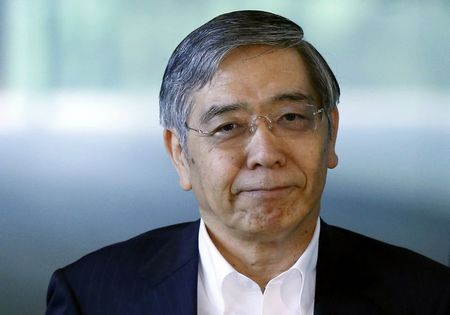By Stanley White
TOKYO (Reuters) - Japan's annual core consumer inflation eased in August in another sign that the Bank of Japan could eventually be forced to take additional easing steps to meet its 2 percent price goal sometime next fiscal year.
But there is virtually no chance for more easing at the BOJ's next meeting ending Oct. 7, although central bankers are sure to debate the BOJ's next "tankan" business survey, which is forecast to show a weakening in sentiment due to a sales tax hike in April.
Lacklustre inflation and sentiment, combined with recent weakness in consumer spending and exports, could also force the government to compile a stimulus package to see the economy through a second sales tax hike scheduled for next year.
"The BOJ will have to ease policy next year, because inflation will not accelerate again," said Takuji Aida, chief economist at Societe Generale Securities.
"The second sales tax hike has already been passed as a law, but the government will implement a large stimulus package."
Core consumer prices, which include oil products but exclude fresh food, rose 3.1 percent in August from a year earlier, less than the median estimate for a 3.2 percent annual gain and following a 3.3 percent annual rise in July.
The BOJ estimates that the sales tax rise, which was implemented in April, added 1.7 percentage point to Japan's annual consumer inflation in April and 2.0 points from May onwards.
Excluding the sales tax hike, annual core inflation slowed to 1.1 percent in August from 1.3 percent in July.
The BOJ had predicted that inflation would slow a little in the middle of this fiscal year, which began in April, as a boost from the weak yen on import prices started to fade.
BOJ officials say inflation will accelerate again due to a tight labour market and rising price expectations, but many economists remain sceptical.
The tankan survey, due Oct. 1, is forecast to show manufacturers turned less optimistic in July-September, and sentiment will probably improve only slightly in the coming quarter, highlighting worries about the economy.
The BOJ is likely to downgrade its gross domestic product forecasts at a subsequent meeting on Oct. 31, economists say, which could fuel speculation that an expansion of quantitative easing is unavoidable.
"The BOJ argues that a tighter labour market will push up wages and prices but I don't think that will happen, given weakness in the underlying economy," said Takeshi Minami, chief economist at Norinchukin Research Institute.
"You cannot rely solely on a weaker currency to achieve sound and stable inflation. As such I expect the BOJ will be forced into additional easing as early as the end of October when it reviews its growth and price projections." ABE STRUGGLES TO LAUNCH "THIRD ARROW"The BOJ has stood pat on monetary policy since April last year, when it pledged to double base money via aggressive government debt and risk asset purchases to accelerate inflation in two years and end decades of deflation.
This aggressive quantitative easing helped pushed the yen to a six-year low versus the dollar. A weaker yen has buoyed exporters' share prices and earnings, but it has raised concerns higher import prices could hurt other firms.
Prime Minister Shinzo Abe is struggling to deliver on his growth strategy, known as the "Third Arrow" of a policy package dubbed "Abenomics."
The government agreed to raise the sales tax in two stages to fund welfare and healthcare spending, but now that Abe's economic agenda is showing signs of stalling, political opposition to the second tax hike could grow.
Abe's cabinet has said it will scrutinise economic data for July-September to decide on the second tax hike at the end of the year.

The economy shrank 7.1 percent in the second quarter, hit by the first sales tax hike, the biggest contraction since the 2009 global financial crisis.
(Additional reporting by Tetsushi Kajimoto; Editing by Shri Navaratnam and Eric Meijer)
